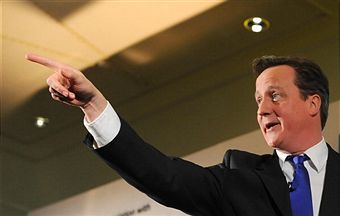 Much ado about a Cabinet split over Europe this morning. The Financial Times has
interviewed Ken Clarke, whose europhile instincts are well known — something he shares with the senior Lib Dems. Clarke tells his
eurosceptic colleagues not to expect powers to be repatriated from the EU at Friday’s summit. Meanwhile, David Cameron has written a piece in today’s Times (£), reiterating that he will veto any treaty that damages British interests. He also says that his ‘requests will be practical and
focussed’. And therein, apparently, lays the split.
Much ado about a Cabinet split over Europe this morning. The Financial Times has
interviewed Ken Clarke, whose europhile instincts are well known — something he shares with the senior Lib Dems. Clarke tells his
eurosceptic colleagues not to expect powers to be repatriated from the EU at Friday’s summit. Meanwhile, David Cameron has written a piece in today’s Times (£), reiterating that he will veto any treaty that damages British interests. He also says that his ‘requests will be practical and
focussed’. And therein, apparently, lays the split.
The word ‘requests’ might open the possibility of repatriation. Cameron appears to be hedging his bets ahead of Friday’s summit, lowering his more rebellious MPs’ expectations before returning with a concession, just as he did in Germany recently. But, in the context of this Times article, ‘requests’ pertains to seeing off an EU power grab in order to protect British interests as they currently stand.
Cameron marks his preferences. He wants all 27 EU member states to sign the treaty so that the single market is preserved. This is the German aim; France, privately at least, is thought to favour an agreement between the 17 eurozone states in which its voice carries more weight. There is a further consideration: an EU-wide treaty will allow the eurozone to use the European Court of Justice and the European Commission to discipline its spendthrift members; but it also gives the remaining 10 states oversight of the Eurozone, to ensure that the disasters the last three years are not repeated and that the single market survives the emergence of two Europes.
Cameron’s central aim is to protect the City from European regulatory innovations, such as the Tobin tax. This is a serious point of contention between Britain and France. Britain argues that financial services must be ‘open’ and cannot fall under excessive burdens governed by Brussels; and France argues that the single market cannot function while London remains an exception to European regulatory norms. (Ken Clarke apparently agrees with the French, telling the FT that the City should accept ‘proper’ regulation from Europe, although he rejects the Tobin tax.)
Finally, Cameron plans to renew his efforts to liberalise the single market, which he believes is vital to economic recovery. He speaks of a ‘new kind of Europe’ which would be flexible, outward looking and competitive. To that end, one can expect him to pursue reform of the Working Time Directive and other elements of the social chapter on Friday, despite what Downing Street officials have told the Guardian. He may even win concessions: Merkel and Sarkozy have both signalled their intention to reform labour law. None of this, of course, amounts to the grand remonstrance desired by swelling legions of Tory backbenchers.






Comments